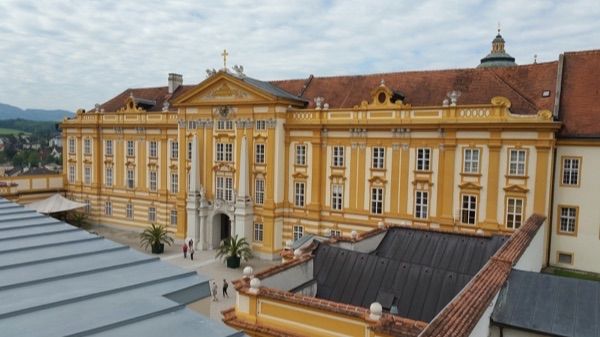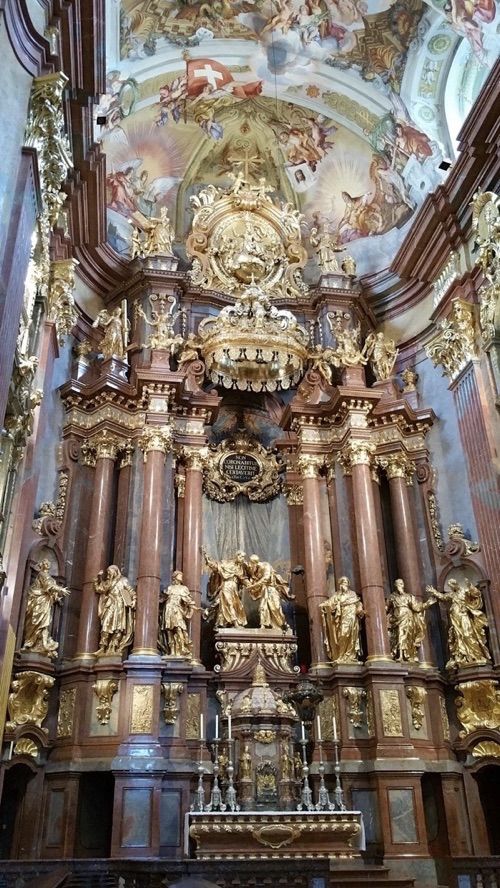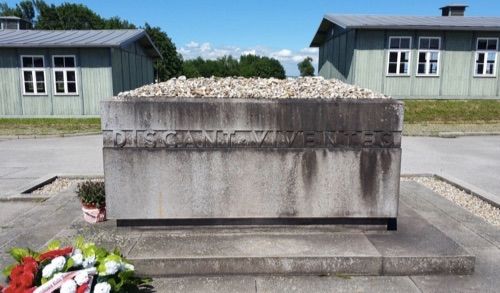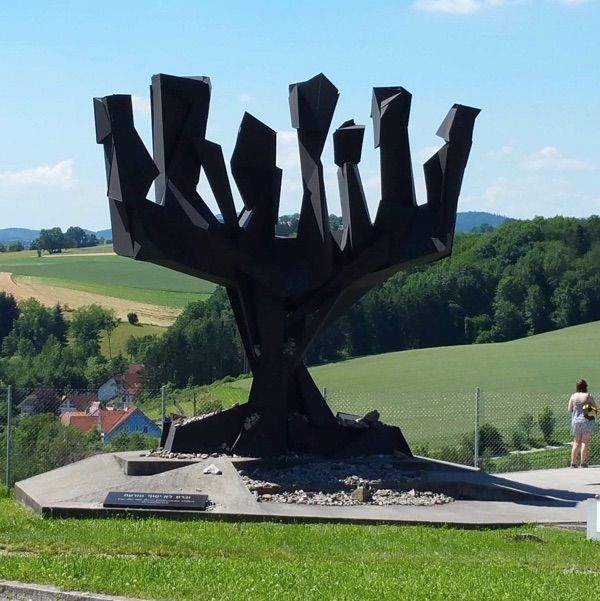Melk and Mauthausen
Altar: (1) a place designated for offering sacrifices to God; (2) marker of a special place, event, or person in order to commemorate or memorialize said event or person.
Wednesday, 22-June, was a challenging day. In order to wrap my head around it, I thought of our site visits as visiting two (very different) altars. [NOTE: I also used this to help students debrief/decompress this morning [23-June] during community time, and it seemed helpful.]
First, we visited a Benedictine abbey at Melk. The photo below, which I took, really doesn't give much of a sense of how huge this place actually is (you might check this photo, which, unfortunately, I did not take).

The shades of yellow and architectural design might betray its baroque style, but the interior screams rococo. After a very good tour through the museum portion and library of the building (no photos of the library were allowed; it's enviable, to be sure), we entered into the abbey church which has the following high altar...

The function of the high altar (so called because it is [a] the chief altar in the church and [b] because it raised on an elevated plane in the sanctuary [note that the altar refers to the table in the lower foreground of the photo]) is primarily that of commemoration and memorial. It reminds people of Christ who offered himself as sacrifice for people's sins; that is, it invites believers to com-memorate ("remember together" as community) the person of Christ and the events of the Passion (death, burial, resurrection). The Eucharist, served from this altar, is to be done as Jesus commanded: "Do this in remembrance of me" (1 Cor 11:24). This was the first altar we viewed that day.
The second altar we saw that day was at Mauthausen concentration camp, and, by comparison with the first, it was quite ignominious and not a little disturbing. Here it is...

The contrasts with the altar at Melk are obvious, but this is still, technically, a "high altar." It's on a raised platform. It is separated from its surroundings and stands out. It speaks a message of commemoration (and action!) loudly and clearly, but that message is much more sombre: Mortuorum sorte discant viventes (Latin meaning something like "From the fate of the dead, the living are to learn").
So, as a means of debriefing after visiting these places, I asked my students to consider the sites we visited in terms of seeing two altars that function as places of commemoration / remembrance. We spent our community time (30 minutes) and cut into our class time (about another 30 minutes) trying to answer "From these altars, what are we to remember, what did we learn, and how did and will it change our lives?" It was deep. It was beneficial.
I know that some of the students—and yours truly—are still trying to process this. Even though I had been to these sites before, I, too, am still struggling to process. The juxtaposition of a site that screams "Hallelujah, praise Jehovah!" with one that echoes the psalmist's "Why, O LORD, do you stand far off? Why do you hide yourself in times of trouble?" (Psalm 10) only added to the difficulty of the day. Yet, as a believer in God, at the end of the day, I, like the psalmist who penned Psalm 10 and who numbers himself among the "helpless," cry out to him to enact justice and to maintain it:
14 But you do see! Indeed you note trouble and grief, that you may take it into your hands; the helpless commit themselves to you; you have been the helper of the orphan. 15 Break the arm of the wicked and evildoers; seek out their wickedness until you find none. 16 The Lord is king forever and ever; the nations shall perish from his land. 17 O Lord, you will hear the desire of the meek; you will strengthen their heart, you will incline your ear 18 to do justice for the orphan and the oppressed, so that those from earth may strike terror no more.
Help me, O LORD, to be humble, meek. Help me to be a person through whom you work justice for the orphan and the oppressed, so that often trite phrase "never again" might become a reality.

Jewish Memorial at Mauthausen
I'm not sure if any of these are my relation, but seeing the family name in the registry of those who died at Mauthausen was quite sobering, to say the least.



